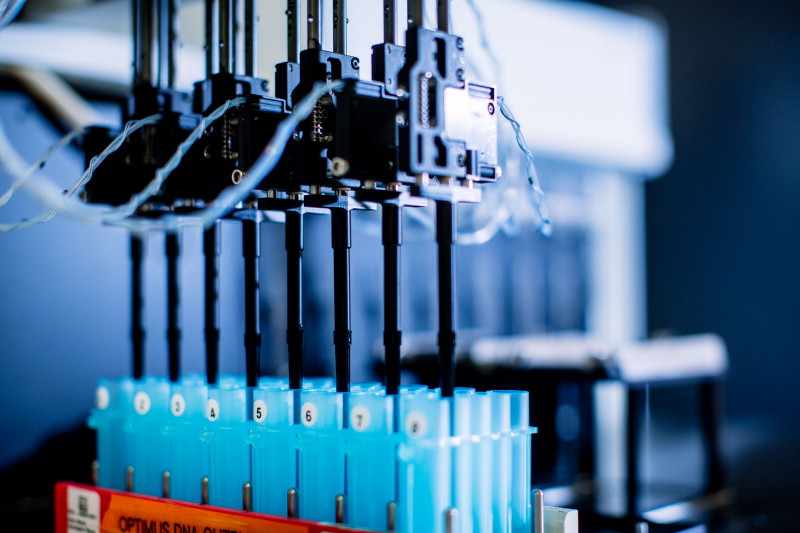-
Featured News
5 new ways health care providers can apply individualized medicine to patient care

ROCHESTER, Minn. — Advancements in individualized medicine are offering health care providers new tools to quickly and accurately diagnose, treat, predict and, eventually, prevent disease. Keith Stewart, M.B., Ch.B., Carlson and Nelson Endowed Director, Mayo Clinic Center for Individualized Medicine, today outlined five new ways individualized medicine has moved from the research lab into clinical care. Dr. Stewart made his statements during the opening of the 2017 "Individualizing Medicine Conference: Advancing Care Through Genomics" in Rochester.
“Individualized medicine is no longer just a promise for the future. Every day, it is moving more deeply into the clinical practice throughout Mayo Clinic and beyond,” says Dr. Stewart. “This is transforming patient care by offering new tests and treatments shaped to each person’s individual genome.”
Here are the five new ways Dr. Stewart says individualized medicine has moved from the research lab into clinical care:
- Advanced genomic tests for more precise cancer diagnosis and treatment
A new test developed at Mayo Clinic and available at the medical clinic can take the guesswork out of which cancer therapies are most likely to be effective. The test known as mate-pair sequencing identifies genetic defects and chromosomal breaks linked to cancerous tumors. This information can pinpoint exact disease-causing genes, opening up new possibilities of individualized therapies targeted to precise genetic mutations. - Blood tests to find cancer and its recurrence at the earliest possible stage
Blood tests that identify pieces of DNA shed into the bloodstream by cancerous tumors are offering the hope of tracking cancer as early as possible ─ when it is most treatable. Mayo Clinic researchers and clinicians are working collaboratively to develop blood tests ranging from those that detect single changes (mutations) in single genes to those that look for thousands of mutations in hundreds of genes. The first test launched in the clinical lab detects a specific change in the BRAF gene, primarily linked to melanoma. This test is available to all health care providers, and results are available in days. The circulating BRAF test offers a convenient, less costly and potentially more accurate picture of cancer activity that can help identify appropriate targeted treatments for advanced disease. Follow-up clinical tests in colorectal cancer, lung cancer and breast cancer will be available shortly. - DNA tests to predict disease
Genomic testing is becoming more accessible to healthy people who want to better understand their own health and risk of disease. Whole-genome sequencing looks at a patient’s entire genetic makeup for information on inherited conditions, genetic variants that drive cancer, and links to disease. The cost for this test, half what it was just a few years ago, continues to drop. That puts this test within reach of more healthy people. Results can be used over the course of the patient’s life.“With advancements in technology, genetic testing continues to become faster and cheaper. One day, in the not too distant future, I believe that whole-genome sequencing will become a common part of proactive health care – possibly even as common as cancer screenings and cholesterol tests,” says Dr. Stewart. “The test only needs to be done once. If entered into the electronic health record, it can, over the course of a lifetime, guide health care providers to an individual approach to predicting and preventing disease.” - Genetic tests for unexplained disorders
DNA sequencing is being used more commonly in clinical care to solve cases of unexplained medical conditions. Genomic sequencing has expanded beyond finding a diagnosis for rare diseases, to include conditions for which there is no definitive cause or cure like chronic liver disease and inflammatory bowel disease. Genetic testing is being used to find a cause and then develop personalized care plans. Gaining a better understanding of these conditions can identify targeted treatments to manage symptoms of these often complex disorders. - Drug-gene testing for more precise medications
Pharmacogenomics uses DNA tests to determine which medications are most compatible with a patient’s genetic makeup. Over the past year, Mayo Clinic has led efforts to apply pharmacogenomics testing proactively to improve patient care broadly and in many subspecialties, such as pediatric gastrointestinal disorders, liver disease and neurosurgery.
Individualized medicine and how it can benefit patients are the key topics of "Individualizing Medicine Conference 2017: Advancing Care Through Genomics." This two-day conference at the Mayo Civic Center in Rochester is bringing together leaders in the field of individualized medicine from around the world. Hundreds of health care providers, researchers and biotechnology innovators are attending.
Dr. Stewart is the Vasek and Anna Maria Polak Professor of Cancer Research Division of Hematology-Oncology, Mayo Clinic.
The Mayo Clinic Center for Individualized Medicine is hosting the Individualizing Medicine conference with support from the Jackson Family Foundation.
###
About Center for Individualized Medicine
The Center for Individualized Medicine discovers and integrates the latest in genomic, molecular and clinical sciences into personalized care for each Mayo Clinic patient. For more information, visit mayoresearch.mayo.edu/center-for-individualized-medicine.
About Mayo Clinic
Mayo Clinic is a nonprofit organization committed to medical research and education, and providing expert, comprehensive care to everyone who needs healing. For more information, visit mayoclinic.org/about-mayo-clinic or newsnetwork.mayoclinic.org.
MEDIA CONTACT
Susan Buckles, Mayo Clinic Public Affairs, 507-284-5005, newsbureau@mayo.edu







